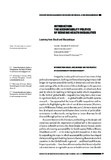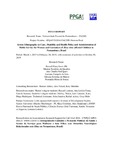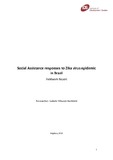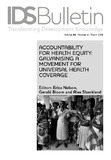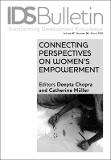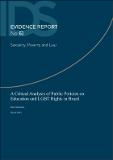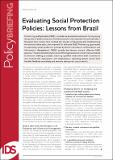Brazil - Social Policy, Health Systems and Inequalities
Browse by
Recent Submissions
-
Brazil’s Engagement in Health Co-operation: What can it Contribute to the Global Health Debate?
(Oxford University Press / London School of Hygiene and Tropical Medicine, 2013-03-27)This commentary draws on a study on Brazilian projects inAfrica (Russo et al.2011) and the authors’ direct involvementwith Brazilian health co-operation to argue that, althoughshaped by its ... -
After Emergency: Social Protection Responses to Zika Virus in Brazil
(IDS, 2020-05-12)The Zika Congenital Syndrome has severe long-term, complex impacts on affected children and their caretakers, demanding state responses even after the withdrawal of the national health emergency status. This paper discusses ... -
Introduction: the Accountability Politics of Reducing Health Inequalities. Learning from Brazil and Mozambique
(CEBRAP, 2019-05-01)Inequality is a key political issue of our times. It has political consequences, fuelling conflict and raising legitimacy challenges for regimes around the world, in democratic and non‑demo‑ cratic settings alike. At the ... -
Action Ethnography on Care, Disability and Health Policy and Administration of Public Service for Women and Caretakers of Zika Virus Affected Children in Pernambuco, Brazil
(PPGA UFPE, 2019)In Brazil, the Zika epidemic, a national and public health emergency declared in 2015, and in effect until early 2016, caused severe neurological damage to over three thousand newborn children (3.179 confirmed cases up to ... -
Social Assistance Responses to Zika Virus Epidemic in Brazil
(Institute of Development Studies, 2019)The complex and unprecedented characteristics of the Zika epidemic in Brazil demanded national and local coordination, the intersection of public policies (e.g., health, social assistance, education) and the creation of ... -
Mutual Learning for Universal Health Coverage
(Institute of Development Studies, 2018-07-04)Accelerating progress towards the goal of achieving Universal Health Coverage (UHC) by 2030 is an essential component of equitable, sustainable and resilient development. 60 per cent of all deaths are caused by chronic ... -
Reducing Health Inequalities in Brazil’s Universal Health-Care System: Accountability Politics in São Paulo
(Institute of Development Studies, 2018-05-01)Brazil relies on the Sistema Único de Saúde (SUS), a public health-care system used by nearly 65 per cent of the population. This article analyses the role played by accountability mechanisms in expanding access to primary ... -
Learning from Brazil's Food and Nutrition Security Policies
(Food Foundation / IDS, 2018-02)This paper provides an overview of the findings of a UK-Brazil learning exchange, which took place between British and Brazilian policy actors working in food and nutrition who were interested in learning from each other’s ... -
Family, Households and Women’s Empowerment in Bahia, Brazil, Through the Generations: Continuities or Change?
(Institute of Development Studies, 2016-03-03)This article identifies changes and continuities in gender relations in a working class neighbourhood in Salvador, Bahia, through the generations. Based on data collected over a period of nearly 20 years, it seeks to ... -
Making the Right to Health a Reality for Brazil’s Indigenous Peoples: Innovation, Decentralization and Equity
(MEDICC Review, 2011-07-01)This article provides an overview of governance arrangements and changes in the Brazilian public health system since 1988, when the “Citizen’s Constitution” declared health to be a universal right. Since then, population ... -
A Critical Analysis of Public Policies on Education and LGBT Rights in Brazil
(IDS, 2014-03)This audit analyses key aspects of public policies in education and sexuality in Brazil, which have been designed as part of the wider programme Brazil Without Homophobia (BWH – Programa Brasil sem Homofobia), launched in ... -
Evaluating Social Protection Policies: Lessons from Brazil
(Institute of Development Studies (IDS), 2013-04)Monitoring and Evaluation (M&E) is considered a valuable mechanism for improving the quality of public policy and has become politically important for policymakers. However, few studies have covered the process of designing ...



